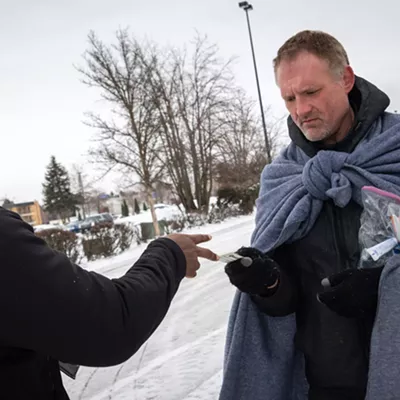In the past decade, I'd argue, no three issues have driven Spokane forward more than transportation, housing and simple governance. Perhaps it's not surprising — in some ways, these are the issues best suited for local government to solve. Whether through transformative investment in the case of Spokane Transit Authority's City Line or legislative change in the case of easing housing rules, this year was a case study in the power of local government to make a difference in residents' lives.
So at the end of the year, I wanted to take a look back at some of the major milestones we've reached in these areas in 2023 and where we could go in 2024.
TRANSPORTATION
After more than 20 years of dreaming about bringing high-capacity transit back to Spokane after arguably an 80-year absence, the City Line officially launched this year, on July 15. The central city bus rapid transit line was completed under budget(!) and features upgraded stations, real-time arrival information, ticket vending machines and other elements designed to make the experience as user-friendly as possible. Station art adds a touch of whimsy and a connection to the neighborhood. And starting in January 2024, buses will run every seven minutes or so, meaning you won't even have to think about a schedule.
While a similar rapid transit line on North Division Street is STA's next major capital project (set for construction in 2027), I'll be paying closer attention to the agency's next strategic plan, Connect 2035. That document will guide the transportation investments that the agency will make over the next decade and inform the next STA ballot measure. The coming year is the best opportunity to give feedback and ideas to help develop the plan. The last big planning document, for example, led to the City Line and Division Street BRT. Could the new plan dream up more BRT lines? Nighttime bus service? Better cross-town connections without passing through downtown? STA planners will be looking for feedback this year, so look to get involved this spring.
Also, watch for action from the Spokane City Council in the new year on pedestrian and bicyclist safety (which council members Zack Zappone and Kitty Klitzke have pledged to prioritize), continued conversation about STA's fare model, and major financial challenges for the North Spokane Corridor project, also known as the north-south freeway.
HOUSING
Earlier this fall, Spokane adopted permanent rules allowing so-called "missing-middle" housing (duplexes, triplexes and similar small multifamily buildings) in residential zones across the city. The housing reform has been praised as a nationwide model, both for its simplicity and for the way conservative and progressive members of our City Council were able to find common ground. But the package isn't a silver bullet, and it will have more impact on housing costs over the next 10 or 20 years than the next two or three.
In 2024, I'll be watching permit applications and — more importantly — construction starts. If the Federal Reserve begins cutting interest rates, look for more of these middle housing projects to break ground in the latter half of next year. City Council members may also consider options for "template" housing plans — essentially, a set of preapproved development plans for duplexes or fourplexes which could be pulled "off a shelf" for construction, with perhaps some material and aesthetic variation. This model has proven remarkably effective in Los Angeles, which created template accessory dwelling units ("casitas") to quickly bring new modest housing stock online.
"The housing reform has been praised as a nationwide model, both for its simplicity and for the way... members of our City Council were able to find common ground."
Also, watch for moves toward additional statewide housing accountability for cities (I'm looking at you, Liberty Lake), along with opportunities to get involved in a big update to the city's Comprehensive Plan, which guides the city's growth and must be updated next year.
GOVERNANCE
Even outside of November's elections, this year brought continued upheaval to City Hall, which made the simple work of governing more difficult. City Administrator Johnnie Perkins resigned following a sexual harassment investigation. In September, we saw the resignation of Jenn Cerecedes, director of the vital Community, Housing, and Human Services Department, which leads the city's homelessness work. And there have been continued challenges in departments as varied as human resources, fire and finance.
And those are just the staffing issues! There were also budget challenges, conflicts over redistricting maps and continued debate over a new regional homelessness authority.
I expect that 2024 will bring more stability to City Hall, not least because Mayor-elect Lisa Brown has significant experience running complex state agencies and has a robust transition team in place.
But I expect questions of governance — basic, foundational questions about how Spokane is planned and run — to continue. Zappone, for example, has suggested a charter commission to draw up more fundamental reforms. A regionalized homelessness response certainly seems to be in the cards, at least in some form. And both Brown and City Council member Paul Dillon have expressed support for alternative response programs for certain types of police calls. As we get into 2024, look for action on all three of these fronts to continue. ♦
Anthony Gill is an economic development professional and writer of Spokane Rising, a blog about ways to make our city a better place to live.
























